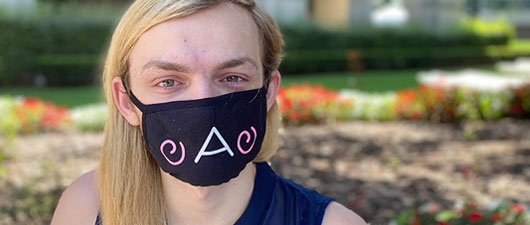 Pictured | Aurora Veazie | History, English | San Diego, California (hometown)
Pictured | Aurora Veazie | History, English | San Diego, California (hometown)
Club Affiliation | Young Democratic Socialists of America (treasurer)
Fundamental Literacies (12 cr.)
The development of certain fundamental skills is necessary for success in academic pursuits and also for success and fulfillment in life beyond the university. Fundamental literacies courses provide introductory training in essential academic skills that students are expected to develop more fully through repeated practice in a wide variety of courses throughout their academic careers.
Students must complete one course from each of the following four areas, as designated in the Schedule of Classes.
Writing
The Campuswide General Education curriculum requires students to demonstrate competence in written composition skills, including development of the ability to analyze written texts from a variety of disciplines and to construct clear and convincing written arguments. A grade of C or higher is required to fulfill the writing requirement.
Such a course should enable students to:
- Develop a thesis that establishes a position in relation to sources,goes beyond common knowledge, can be debated,and provides control, direction, and purpose to the paper.
- Incorporate concrete examples in most body paragraphs to develop the thesis.
- Incorporate an organizational structure that presents paragraphs in a meaningful progression.
- Demonstrate control over grammar errors while maintaining the sentence-level flexibility to clearly articulate ideas.
- Demonstrate sustained engagement with evidence (i.e. quotations) using appropriate citation form.
- Engage in writing as a social process that includes multiple drafts, collaboration and reflection.
- ENG-W 131 Reading, Writing, and Inquiry I
- ENG-W 140 Elementary Composition-Honors
Oral Communication
TheCampuswide General Education curriculum requires students to develop skill both in formal oral presentations and in the ability to recognize conventions of oral communication and the ways in which oral communication is enhanced and expanded by nonverbal means.
Such a course should enable students to:
- Create messages appropriate for the intended audience(s)
- Use appropriate supporting materials to communicate credibility and explain complex concepts to audiences.
- Organize messages to support a purpose, following an organizational pattern
- Demonstrate an understanding of ethics and authenticity in communication with others
- SPCH-S 121 Public Speaking
Quantitative Reasoning
The Campuswide General Education curriculum requires students to demonstrate competence in mathematical reasoning by successful completion of an approved course. Students scoring a 76 or higher on the ALEKS math placement exam are encouraged to contact the Math department or other departments that offer those approved courses for test-out options.
Such a course should enable students to:
- Explain information presented in mathematical forms (e.g. equations, graphs, diagrams, tables, words)
- Convert relevant information into various mathematical forms (e.g. equations, graphs, diagrams, tables, words).
- Perform mathematical calculations.
- Communicate quantitative evidence in support of an argument for various purposes and audiences (including general audiences).
- CJUS-K 300 Techniques of Data Analysis
- HSC-H 322 Epidemiology and Biostatistics
- MATH-K 300 Statistical Techniques for Health Professions
- MATH-K 310 Statistical Techniques
- MATH-M 108 Quantitative Reasoning
- MATH-M 109 Mathematical Foundations of Analytics
- MATH-M 111 Mathematics in the World
- MATH-M 115 Precalculus and Trigonometry (5 cr.)
- MATH-M 118 Finite Mathematics
- MATH-M 119 Brief Survey of Calculus 1
- MATH-M 126 Trigonometric Functions
- MATH-M 127 Pre-Calculus with Trigonometry (5 cr.)
- MATH-M 208 Technical Calculus I
- MATH-M 209 Technical Calculus II
- MATH-M 215 Calculus I (5 cr.)
- MATH-M 216 Calculus II (5 cr.)
- NURS-H 355 Data Analysis and Research
- PSY-P 354 Statistical Analysis in Psychology
- SOC-S 351 Social Statistics
- SWK-S 372 Statistical Reasoning in Social Work
Critical Thinking
TheCampuswide General Education curriculum requires students to demonstrate competence in reasoning skills, including the ability to analyze, construct, and develop cogent arguments, and to articulate reasoned judgments.
Such a course should enable students to:
- Identify reasons that support a claim
- Construct arguments for and against a claim
- Use widely accepted standards for evaluating the quality of evidence and reasoning
- AHLT-R 416 Trends and Issues in Medical Imaging Technology I
- CSCI-C 250 Discrete Structures
- ENG-W 270 Argumentative Writing
- HPSC-X 200 Scientific Reasoning
- HSC-H 492 Research in Health Sciences
- HSC-W 314 Ethics and Health Professionals
- PHIL-P 101 Philosophy in the Public Sphere
- PHIL-P 102 Critical Thinking and Applied Ethics
- PHIL-P 105 Critical Thinking
- PHIL-P 110 Introduction to Philosophy
- PHIL-P 250 Introductory Symbolic Logic
- POLS-Y 201 Controversies in United States Politics
- PSY-P 205 Understanding Research in Psychology
- PSY-P 211 Methods of Experimental Psychology
- SOC-S 204 The Sociological Imagination
- SPCH-S 228 Argumentation and Debate